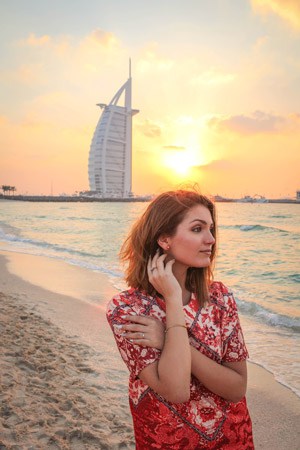 If the sun and warmth is your thing, Dubai certainly has plenty of it. Summers are very hot and humid, with daytime temperatures often climbing to 40 °C or higher. Winters are still warm, with an average daytime temperature of 25 °C. But even if you’re a heat-lover, Dubai’s tropical desert climate has a downside. In particular, it can pose several threats to your eyes.
If the sun and warmth is your thing, Dubai certainly has plenty of it. Summers are very hot and humid, with daytime temperatures often climbing to 40 °C or higher. Winters are still warm, with an average daytime temperature of 25 °C. But even if you’re a heat-lover, Dubai’s tropical desert climate has a downside. In particular, it can pose several threats to your eyes.
One of the biggest concerns is the ultraviolet (UV) rays, which come from the sun. There are two types of UV rays: UVA and UVB. The first type makes up 95 percent of all the UV rays that reach the earth’s surface. This type of UV is the most damaging. It is most often associated with premature skin aging and wrinkling, and can cause skin cancer. UVB rays, on the other hand, are the types of UV rays responsible for sunburn and reddened skin.
Probably when most people think of “sun damage” what comes to mind is what was just mentioned: the harmful effects of UV rays on the skin. However, it’s important to understand what sun exposure can also do to your eyes and vision.
For starters, your eyes can actually become sunburned. The technical term for this condition is photokeratitis. To be precise, this is when the sun’s UV rays temporarily damage the cornea (the transparent outermost layer of the eye) and the conjuctiva (a layer of cells covering the inside of the eyelid and the whites of the eye). Symptoms of photokeratitis include redness, tearing, itchiness and a gritty feeling similar to getting chlorine, sand or salt in the eye. Usually the symptoms of photokeratitis last no more than 24 to 48 hours. However, prolonged and unprotected sun exposure can cause more permanent damage, including discolored corneas and cloudy vision.
UV rays have also been implicated in the development of conditions such as pterygium (tissue growth on the whites of eyes that can block vision), cataracts (a clouding of the lens of the eye), macular degeneration and skin cancer on the eyelids. Furthermore, unprotected sun exposure has the potential to reverse the effects of LASIK surgery.
But UV radiation is just one issue. Dubai residents must also deal with the extreme, persistent heat. The high temperatures can cause your body to become dehydrated, which can negatively impact your eyes. Understand that when you’re dehydrated, your eyes lose moisture. This can make your eyes feel sore and dry from lack of tears. If your eyes are continually dry for prolonged periods of time, this can potentially lead to early cataracts.
Of course, the third big environmental threat to your eyes when you live in Dubai is the sandstorms. Particularly during summer, low pressure systems often develop in the region, creating strong northwesterly winds that start blowing across Saudi Arabia and by the time they reach Dubai, they are extremely gusty and unpredictable. These winds can whip up the desert sand, creating huge sandstorms. Besides reducing visibility, the blowing sand can get into your eyes and severely irritate them. Sandstorms can even lead to temporary blindness or permanent eye damage.
Fortunately for Dubai residents, there are steps you can take to protect your eyes from sun, sand and heat. Here are seven important steps you should take:
Wear sunglasses when outdoors.
To protect your eyes, wear sunglasses that are labeled “UV400,” which means they absorb 100 percent of both UVA and UVB rays. This is the highest level of protection available, shielding your eyes from even the tiniest rays. Wraparound sunglasses or oversized frames are best, as they can prevent UV light entering the eyes from all angles.
It is especially important to wear your sunglasses when you’re in an area with highly reflective surfaces like sand or water. However, you should also wear them on cloudy days and while you’re driving because UVA rays can penetrate clouds and glass. If you have children, encourage them to wear sunglasses whenever they are outdoors to protect their growing eyes. If you recently had LASIK surgery, comply with your surgeon’s directions and wear the protective eye shields or sunglasses provided.
 Sport a wide-brimmed sun hat.
Sport a wide-brimmed sun hat.
Wear a wide-brimmed hat (ideally of 3-inches or more) or visor whenever you’re out in the sun. This will not only protect your eyes from the sun, it will also keep those dangerous UV rays off your face.
Use lubricating eye drops.
Keep your eyes lubricated with eye drops to prevent sand and other unwanted particles from becoming stuck inside of your eyes. “Artificial tear” eye drops can be purchased on an over-the-counter basis, and work well to keep your eyes hydrated. Choose a brand of eye drops without preservatives (which can irritate your eyes), and use the drops every couple of hours when you’re eyes are dry.
Stay indoors when outdoor temperatures get too high.
During excessive heat waves, postpone outdoor activities and stay inside as much as possible. If you must go outdoors, do so before 11 a.m.or after 3 p.m. when outdoor temperatures are cooler. Always keep an eye on the weather forecast so you know what days the temperatures will be their highest and lowest, so you can make plans accordingly.
Turn off the air conditioning when it’s not too hot.
Sometimes the concern isn’t just the outdoor heat, but the cool indoor air from the air conditioner. Air conditioning is one of the main causes of dry eyes. Obviously, with Dubai’s very warm year-round weather, the air conditioning needs to be on most of the time, not only at home but also in offices, malls, supermarkets and other public buildings. Certainly you can’t control the air conditioning when you’re in public places. But when you are at home, on the days when it’s not excessively hot, try turning off the air conditioner. Instead, use fans or open windows to let the cool air circulate. This will be a nice relief for your eyes, and may also cut back on energy costs!
Cover your eyes and face during sandstorms.
Obviously, the best way to protect your eyes from sandstorms is to not go outdoors when the sand is blowing. But if you can’t avoid going outside, wear airtight goggles or a mask. If you’re concerned about how you look, you may be able to get by with wraparound sunglasses. If you suddenly find yourself in blowing sand and you don’t have any kind of protective eyewear with you, shield your face with your arm while you walk or run. If you have a scarf or sweater, wrap it tightly around your head to protect your eyes and ears.
 Stay hydrated.
Stay hydrated.
Don’t wait until you feel parched or thirsty to drink something. To avoid dehydration and the potentially harmful effects on your eyes, drink plenty of fluids throughout the day to keep your body hydrated. The best fluids for staying hydrated are water, fruit juices, milk and herbal teas. Limit your intake of alcohol, sodas and other sugary drinks, and caffeinated beverages like tea and coffee, all of which can dehydrate you.
What’s the bottom-line? The year-round sunshine, warm temperatures and gorgeous sand beaches can all be pluses of living in Dubai—as long as you protect yourself. The tips above, along with seeing your eye doctor on a regular basis for eye exams, will help you protect your eyes and preserve your vision. For additional information about how to protect your eyes or to schedule an eye exam with Dr. Ashraf, please call the Atlanta Vision Eye Clinic at 971-4-348-6233 to book your appointment.
